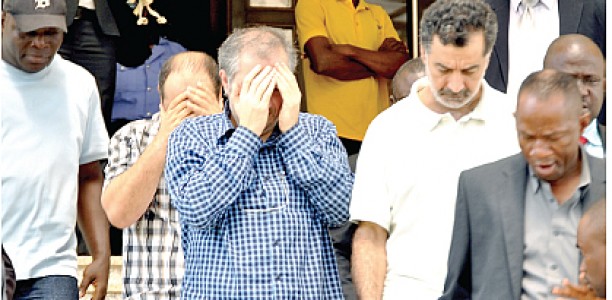The federal government has filed six-count fresh set of charge against three Lebanese – Abdullahi Thaini, Mustapha Fawaz and Tahal Roda – being held over alleged terrorism activities.
Counsel to the State Security Service, Clifford Osagie, disclosed this yesterday in Abuja at the resumed trial of the case filed by the Lebanese for the enforcement of their fundamental rights.
Also yesterday, a Federal High Court in Abuja dismissed the no-case submission made by the alleged mastermind of the 2011 Christmas Day bombing at St. Theresa’s Catholic Church, Madalla, Niger State, Kabiru Umar (aka Kabiru Sokoto).
“Hezbollah has a military wing. In the next few days Nigerians will know more about this,” Osagie told a Federal High Court in Abuja while arguing a counter affidavit the SSS filed against an application for the enforcement of the fundamental rights of the detained Lebanese.
Government also said the three belonged to the military wing of the Lebanon-based Hezbollah. The three are being held for alleged unlawful importation and stockpiling of cache of firearms and ammunition.
Osagie said the fresh charge filed before the Federal High Court, Abuja by the Attorney General of the Federation charged the suspects with offences bordering on terrorism.
It was learnt that the charge, which was filed on Thursday, had not yet been assigned to any judge for hearing.
According to him, men of the State Security Service found in the homes of the suspects prohibited firearms and ammunition as against their claim that what was found in their homes were “mere riffles and hunting guns.”
Osagie argued that under the Firearms Act, the weapons found in the homes of the suspects “can not be issued without license. The applicants should have exhibited receipts of purchase of the weapons and the license enabling them to carry such deadly weapons.”
He urged the court not to serve as refuge for people whose activities allegedly threaten and undermine the nation security.
He denied the applicants’ claim that their arrest and detention by the state violated their fundamental right to liberty.
Osagie said the SSS observed due process and procured the necessary warrants from the court, both in Kano and Abuja before detaining them.
He noted that although the detention warrant issued by a Magistrate’s Court in Karu, Abuja lapsed on June 19 the suspects were still being held on the order of remand earlier made by the Federal High Court, Abuja.
He urged the court to dismiss the suspects’ application for being frivolous; intended to perverse the course of justice, and for “not being in the interest of Nigeria and its national security.”
The applicants’ lawyer, Ahmed Raji, had while arguing his clients’ application, faulted their continued detention.
He faulted the remand warrants obtained by the SSS and on which basis the suspects were detained.
He argued that the warrants, having been issued by Magistrate Courts, were not competent.
Raji contended that since Magistrate Courts lacked the jurisdictional competence to hear terrorism related cases they could also not order the remand of people held for such offence.
Justice Adeniyi Ademola adjourned till June 24 for Raji to reply on point of law to Osagie’s argument.
The judge ordered that the suspects be returned to SSS’ custody and to be reproduced in court in June 24.
In the case of Kabiru Sokoto, the suspect had, at the completion of the prosecution’s case on May 16 argued that no prima facie case was made out against him and asked the court to discharge him.
But in a ruling delivered yesterday, Justice Adeniyi Ademola held that the prosecution had established a prima facie against the accused person through the evidence brought before the court.
He held: “The court having held that a prima facie case had been made against the accused person, his no-case-submission fails.
In the circumstance, the accused person has a case to answer. He is hereby called upon to open his defence.”
Defence lawyer, Ibrahim Umar had in his submission on June 14 argued that the prosecution failed to produce sufficient evidence to link the suspect with the charges of terrorism leveled against him.
Counsel urged the court to discharge and acquit him.
He further argued that the proof of evidence before the court did not link his client to the crimes alleged against him.
The defence lawyer contended that the evidence so far led by the prosecution failed to establish any offence against his client.
He further argued that the evidence by all the six prosecution witnesses amounted to hearsay and urged the court to disregard it.
Prosecution lawyer, Mrs. Chioma Onuegbu, in her counter submission, argued that the state had sufficiently made out a prima facie against the suspect.
Onuegbu asked the court to discountenance the defence counsel’s submissions.
[Punch]

